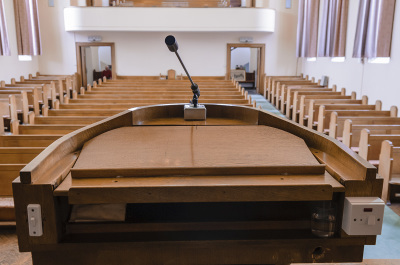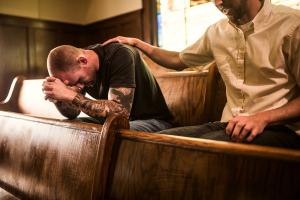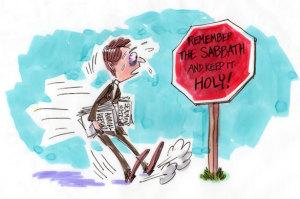When preaching leaves a church, Christ goes with it

For centuries leading up to the dawn of the Reformation era in the 16th century, the Roman Catholic Church had deformed the church of Jesus. The blueprint for the church as recorded in God’s inerrant and sufficient Word had been so distorted and disjointed, that the God ordained form of the church had been lost.
Every aspect of the church of Christ had been twisted and repackaged into a deformed and deficient substitute that necessitated a reforming of the church into the original mold. That process would be far more than what Martin Luther thought when he attached his 95 Theses to the Castle Church door in Wittenberg on October 31, 1517.
The historic deformation
The explosion of the historic Reformation was fueled by Word of God. The Material Principle of the Reformation was focused on justification by grace alone, through faith alone, in Christ alone for the remission of sin. However, the Formal Principle of the Reformation was focused upon the issue of authority. Who can speak for God? Was it the Pope of Rome? Was it the councils of the Roman Catholic Church?
The Reformers were focused on bringing the Bible to the people. The priests were lecturing to the people in Roman Catholic cathedrals in Latin, a language that the common people didn’t speak or understand. The worship was lifeless. There was no preaching. There were no preachers. The pulpit had been hijacked and pushed into the shadows as the Roman Catholic mass emphasized the altar as the central aspect of their worship. The pulpit was occupied by men who delivered shallow homilies in a dead language which kept the people in a cloud of confusion and darkness.
When preaching leaves a church, Christ goes with it.
When God raised up the Reformers, they gave themselves to the translation of the Bible and the proclamation of sacred Scripture. Martin Luther gave the people the German Bible. William Tyndale labored to bring the people the English Bible. John Knox was involved in bringing the people the 1560 Geneva Bible — the Bible of the Reformation. You can literally trace the movement of the Reformation to the movement of God’s Word.
The Reformers were gifted scholars, theologians, linguists, orators, authors, and Bible commentators. However, it was the pulpit where they took flight and powerfully delivered the Word to the people through relentless and powerful preaching of God’s Word. Martin Luther preached sometimes four times per day and approximately 4,000 sermons in his preaching ministry. His first sermon each Lord’s Day was at 5 am and he would preach every day through the week.
John Calvin was the expositor of the Reformation who labored verse-by-verse through books of the Bible in Geneva. From his local church were sent out many missionaries who would give their lives for the sake of the Gospel. It was preaching, and relentless preaching that fueled the Reformation. He was a faithful expositor of the Word.
- He began his series through Acts in 1549. He completed it in 1554.
- He preached 25 sermons on Lamentations.
- He preached 5 sermons on the 21 verses of Obadiah.
- He preached 46 sermons through 1 and 2 Thessalonians.
- 1 and 2 Corinthians — 186 sermons.
- He preached 86 sermons through the pastoral epistles.
- His series through Galatians was 43 sermons.
- He preached 174 sermons through Ezekiel.
- He preached 48 sermons through Ephesians.
- He preached 159 sermons through Job.
- His series through Deuteronomy was 200 sermons long.
- He labored through Isaiah in 353 sermons.
- His series through Genesis was 123 sermons in length.
John Knox believed in preaching and was a powerful preacher. He is known as the founder of Presbyterianism and the father of Puritanism. He was a relentless defender of the Gospel of Jesus and a passionate Reformer in Scotland. Knox said that preaching is the “chief ordinary means of grace.” If you look at the paintings of Knox preaching as recorded in church history, he looks as if he is taking flight from the pulpit as he hangs over the front of the sacred desk of God with his hands pointing into the faces of the people. Knox was no boring preacher who simply merely saw himself as giving a lifeless biblical commentary to the people. Knox was a preacher.
While God raised up gifted and powerful servants to be instruments in the hands of our God to reform His Church, it was ultimately fueled by the Word of God. That’s why when you travel around the world, wherever you see large statues of the Reformers, they are almost always pointing at the Bible in their hand. In Berlin, the large statue of Luther depicts him pointing to the Bible. At the Reformation monument in Worms, Germany you will find the men pointing to the Bible. In London in the courtyard of the Royal Horseguard hotel, you will see William Tyndale pointing at the Bible. If you travel to Bedford, England you will find John Bunyan pointing at the Bible.
When the Bible is opened and expounded among God’s people, it always results in a reforming of his people to conform to the Word.
The modern deformation
Today, if you visit many evangelical churches you will notice that there is a constant deformation of God’s church that continues in our day. The form of God’s church is consistently being changed by every wind of culture. Pastors look to the culture to see what the people want and then form their local churches in that mold. It’s the ancient temptation of pragmatism. There is always a cultural scheme offered to pastors that promises success. That typically means bigger numbers and increased financial budgets. In the end, it leads the church off course. Sometimes the move is subtle or slight and barely detectable, but decades and centuries removed it will be catastrophic.
Any move away from biblical preaching is a move away from God. When preaching is minimized and muzzled, it leads to a downgrade of the entire Church of Jesus. Rather than asking the culture what they want, we should look to the Word of God that remains fixed and sufficient for the answer. If the form of God’s Church is to be kept unstained and unaltered, it must be through a firm commitment to the Formal Principle of the Reformation. Who has the right to speak on behalf of God? The answer is the same in our day. Sola Scriptura!
When Jesus was preparing his disciples for his departure, he gave them a Great Commission. In that commission, we find one word that must not be overlooked. Sometimes the Great Commission from Matthew 28:17-20 is quoted with a slight omission. While it may seem minor and harmless, it’s a word that must not be omitted from Jesus’ words. Jesus said:
And Jesus came and said to them, “All authority in Heaven and on earth has been given to me. Go therefore and make disciples of all nations, baptizing them in the name of the Father and of the Son and of the Holy Spirit, teaching them to observe all that I have commanded you. And behold, I am with you always, to the end of the age” (Matt 28:18-20).
The word translated “observe” is critically important. The Greek term is “τηρέω” which literally means to keep, guard, or preserve. As the Bible is faithfully preached and explained on a weekly basis, the people will see and hear God’s Word clearly presented. As they come to understand God’s original form of His Church — it is the calling of God’s people to consistently keep that form unstained and pure. In other words, we are to be consistently reformed according to God’s Word in our day.
Historically, a phrase became popular during the time of the Reformation. It was “ecclesia reformata, semper reformanda.” The Latin phrase means, “The church reformed, always reforming.” The short version is, “Semper Reformanda.” If we will be consistently reformed according to God’s Word, it must begin with faithful biblical preaching. The primacy of preaching will result in a proper order among God’s Church. It’s the pulpit that drives reformation and health in the life of a local church. Luther believed that the pulpit was the throne of God’s Word among his people. If we will experience a reformation in our day, it will begin by a firm and unwavering commitment to biblical preaching.
The Church must always keep the pulpit at the heart of the Church. The primacy of preaching must be carefully guarded. Every ministry in the life of the Church rises or falls based on the health and strength of the pulpit. As the pulpit goes, so goes the Church.
Originally published at G3 Ministries.
Josh Buice serves as the pastor of Pray’s Mill Baptist Church, a 180-year-old church where G3 Conferences began. Josh is the husband to Kari and father of four children: Karis, John Mark, Kalli, and Judson. He studied at the Southern Baptist Theological Seminary, where he earned his MDiv and DMin in expository preaching. He also serves as Assistant Professor of Preaching for Grace Bible Theological Seminary in Conway, Arkansas. Josh has a passion for biblical preaching, missions, church planting, and the local church. In his spare time, he enjoys reading, running, hunting, and spending time with his family.




























